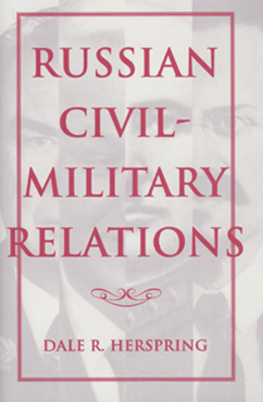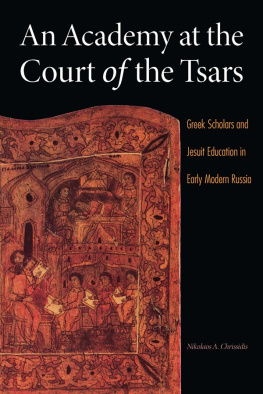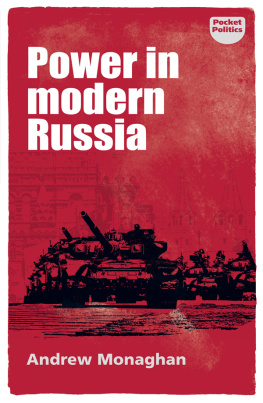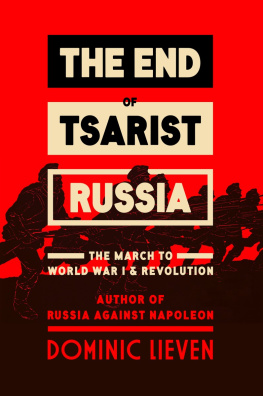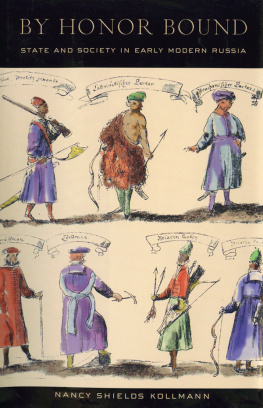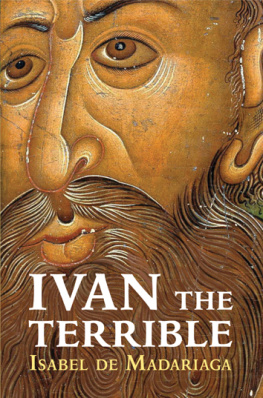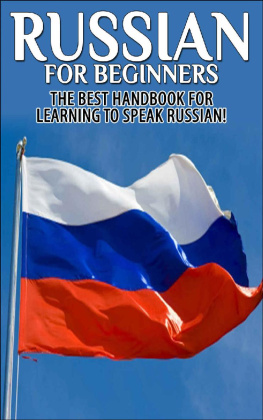Grigorii Karpovich Kotoshikhin
Russia in the Reign of Aleksei Mikhailovich
Grigorii Karpovich Kotoshikhin
Russia in the
Reign of Aleksei
Mikhailovich
Trans lated by Benjamin Phillip Uroff
Edited by Marshall Poe
Managing Editor: Katarzyna lusarska
Published by De Gruyter Open Ltd, Warsaw/Berlin
This work is licensed under the Creative Commons Attribution-NonCommercial-NoDerivs 3.0 license, which means that the text may be used for non-commercial purposes, provided credit is given to the author. For details go to http://creativecommons.org/licenses/by-nc-nd/3.0/.
Copyright 2014 Grigorii Karpovich Kotoshikhin
ISBN: 978-83-7656-064-9
e-ISBN: 978-31-1036-814-7
Managing Editor: Katarzyna lusarska
www.degruyteropen.com
Cover illustration: A. Olearius, The Travels of Olearius in Seventeenth-Century Russia, trans. and ed. Samuel. H. Baron (Stanford, Calif.: Stanford University Press, 1967)
Contents
This book is dedicated to the memory of Benjamin Philip Uroff
About Benjamin Uroff
In Bens first college course in Russian history, at Yale around 1952, I had the good luck to be his teacher. He was exceptionally promising. He had learned Russian at home and had read broadly in both Russian and English. As he went on to finish Yale and then to earn his doctorate at Columbia, he accomplished his copiously annotated translation of Kotoshikhins work on Russia in the reign of Aleksei Mikhailovich.
At that point and later several professional historians of Russia said they considered Bens dissertation to be virtually ready to publish. But Ben, ever meticulous, insisted that there were a few little things he wanted to improve before he submitted it for publication. Sadly, those few things were still blocking the way right up until his retirement and unexpectedly sudden death.
Meanwhile, Ben became as knowledgeable about Russian history as anyone else I have encountered in my half-century in the field. But this had drawbacks. He kept on learning about other works he wanted to read before he published. As a keen judge of other peoples writings, he could see well how he might improve his own.
Bens many students, from the 1960s on, were largely unaware of his frustrations. He was an inspiring teacher with a delightful sense of humor. These qualities were appreciated by his professional colleagues, especially those who had managed to get past the shyness and self-doubts that plagued Ben increasingly during his later years. Many of those colleagues, including visiting scholars, knew of Bens part in launching our Summer Research Lab in the 1970s. To them and to later researchers he was almost magical in his ability to guide them to historical sources best suited to their needs and to discuss with them disputed points of interpretation. Visitors sometimes wondered aloud how it was that they had never heard of this fellow Uroff who seemed to be already thoroughly familiar with most of their publications.
Bens low profile in the academic world was of his own design. His two-volume dissertation, submitted routinely of course to University Microfilms, remained in typescript, unknown except to those who sought out that source. How might his life have changed if he had allowed his friends to sneak the work off to a press?
Ben had my admiration and affection. Happily for our field (and for Bens family!), Bens fellow-specialist Marshall Poe has been willing to devote himself to the labor of updating Bens study and to publishing it. I applaud him most warmly!
Ralph T. Fisher Jr.
University of Illinois, Urbana-Champaign
From Marshall Poe
In the fall of 1999, I decided that it was high time that the field of Russian studies had a good published English translation of Gregorii Kotoshikhins remarkable Russia in the Reign of Aleksei Mikhailovich. There is no better introduction to Muscovite Russia than this book. I knew that Ben Uroff had translated the text in his 1970 Columbia University dissertation. More accurately, everyone who worked in the field knew that Ben had translated it because everyone in the field had used it. Never had there been a more popular dissertation. I had a well-worn copy myself. Bens dissertation was and remains a remarkable piece of scholarship. To call it simply an annotated translation is to freight the word annotated with a weight it cannot bear. The dissertation is a sort of encyclopedia of Old Russia with Kotoshikhin providing the main entries and Ben filling in all the details. And I mean all the details. The annotation contains close to 1,000 long, discursive, reference-heavy footnotes taking up over 300 pages. If you want to know about something in Muscovy, Bens dissertation is a good place to start.
I wondered why Ben hadnt published his thesis. I had never met him, so I had never had the opportunity to inquire. I asked around and discovered that Ben was a bit of a mystery. A few people had met him at Illinois, where Ben taught for many years, either during graduate school or while attending one of the universitys summer workshops. But even they couldnt say much about him. I pursued the case no further and set about drafting my own translation.
I didnt get far. I translated a few pages and then decided to check them against Uroff. This was discouraging, because Uroff was better every time. I gave up and decided to write Ben to ask if hed like help preparing the book for publication. Yes, he responded, hed love to publish the book. It seemed as if hed been waiting for someone to ask. And so we started our partnership. Ben seemed to enjoy the entire processpreparing and revising the manuscript, drafting the publication prospectus, and working toward eventual publication of the work.
Alas, Ben passed away in October, 2005, before he could see the book in print. This is sad, there is no other word for it. But I take solace in the fact that in his last years he knew that his great work would finally be published. I also think he would be pleased with the result. The translation is almost entirely his, just as it was found in his dissertation. I have made certain alterations, primarily to bring Bens words into line with current scholarship. Since 1970 we have learned much about Muscovy. We have also learned a lot about Kotoshikhin and his text, thanks largely to the efforts of the late Ann E. Pennington. Her O Rossii v tsarstvovanie Alekseia Mikhailovicha. Text and Commentary (Oxford: Oxford University Press, 1980) provides what is now and likely will forever be the definitive edition of Kotoshikhins work from a linguistic point of view. Ben did not have access to this book, though he had and used Penningtons dissertation The Language of Kotoshikhin (Oxford University, 1965). If Ben had had Penningtons edition, he surely would have used it. He told me as much. So I felt no hesitation in using it to fine-tune Bens rendering.
This book is an edition of Bens translation, first published in his dissertation Grigorii Karpovich Kotoshikhin, On Russia in the Reign of Alexis Mikhailovich: An Annotated Translation (Columbia University, 1970). It is intended to make an English text available to students and non-specialist scholars who might not otherwise have access to Kotoshikhins work. Muscovite-era experts will of course want to use Penningtons Russian edition, and they will know that there is an extensive literature devoted to Kotoshikhin, much of which can be found simply by searching scholarly databases such as JSTOR or Project Muse. Because this book is meant for nonspecialists, I made a number of changes to Bens original work. I characterize them below.


